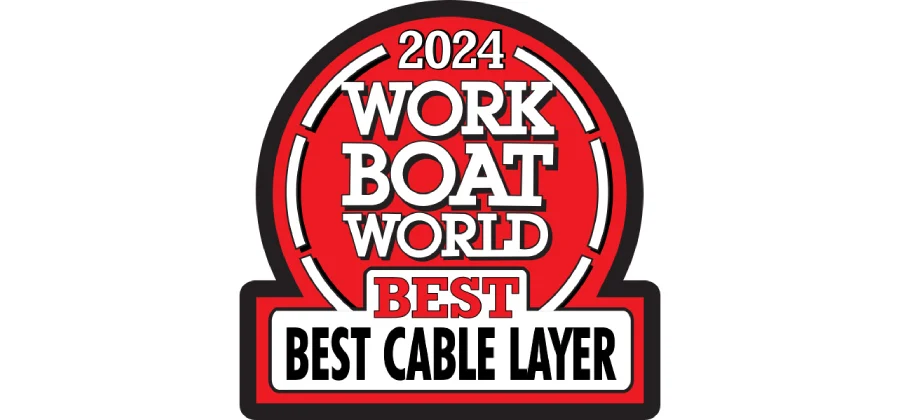AWARDS 2024 | Best Cable Layer – Freja – Vard
Built by Norway’s Vard, the spectacular 95-metre Freja is a cutting-edge cable-laying vessel designed for offshore renewable energy projects, including inter-array cable installation, repair, and fibre optic laying.
Its hybrid diesel-electric propulsion, with a 1,790kWh battery, ensures fuel efficiency and a 14-knot speed. Features include a DP2 system for precise station-keeping, two cable carousels (2,500 and 1,750 tonnes), a walk-to-work gangway, and an ROV hangar for versatile operations.
With 60 single cabins, Freja supports extended missions, bolstering offshore wind capabilities, and has high potential for conversion to other roles in the future if required.
"Freya is designed and built specifically for the renewable energy market, serving as a state-of-the-art cable layer for inter-array cables," Roy Arne Stavik, Senior Vice President for Sales at Vard, told Baird Maritime. "She will play a vital role in enabling the installation of offshore wind farms in the years ahead."
Stavik said the vessel is also one of the first cable layers with a permanently installed walk-to-work system, combining cable-laying equipment and a gangway solution in a single platform.
"For the very first time in Vard’s history, both cable carousels [fitted on the vessel] were fully constructed at Vard Shipyards Romania. The design and project execution of the carousel delivery were carried out by the owner together with their partners, while Vard had the pleasure of producing them for the owner."
The vessel was delivered ahead of the contractual date, less than two years from the time the contract was signed, which Stavik said is, "very unique in today’s market."
"Working with new partners on the topside and cable-laying systems added some complexity to the project," said Stavik. "It wasn’t without its challenges, but the process turned into a constructive collaboration that provided important learning for everyone involved."
Stavik explained that despite the complexity, the collaboration was a successful one from which the owner, the suppliers, and Vard all gained valuable experience and knowledge that can be applied in future projects.
"The strongest driver right now is the push for decarbonisation," said Vard's Chief Sales Officer Christian Utvik when asked about trends impacting shipbuilding. "Regulations from the IMO and the EU are shaping ship design and operation. This accelerates the need for vessels prepared for alternative fuels and energy-efficient designs.
"At the same time, we see growing requirements for safety, automation, and cyber resilience. For Vard, these developments reinforce the importance of our integrated value chain and our focus on innovation."
Utvik said that it means designing vessels that are future-ready while also ensuring they are safe and cyber resilient. Vard therefore works closely with customers and technology partners to integrate advanced systems and solutions into tailor-made vessels.
"Regulations are not just a challenge, but a driver for us to deliver greener, safer, and more advanced ships," he told Baird Maritime.
Utvik remarked that 2024 was a solid year for Vard, as evidenced by what he said is healthy activity across all of the company's main markets, namely, energy, seafood, security and aftermarket, as well as high demand for advanced, tailor-made vessels that can handle complex operations.
"Our integrated value chain has been a key advantage in securing major projects and delivering on commitments. Looking ahead, we are optimistic. The industry is moving quickly toward greener and smarter operations, and we are well positioned to support our customers in that transition."
In Utvik's view, the offshore wind sector will continue to expand and drive demand for new vessel types. Oil and gas will continue to be an important market, though he said that efficiency and lower emissions are key.
"We expect to see more hybrid power, alternative fuels, and automation — supported by even closer collaboration across the industry."
Utvik remarked that Norwegian shipbuilding must remain forward-leaning and specialised to succeed in the years ahead.
"Competing on price against lower-cost countries is not sustainable; instead, strength lies in advanced design, integration, and niche expertise."
By leading in green propulsion solutions such as battery–methanol hybrids and ammonia-ready platforms, and by focusing on complex high-spec vessels for aquaculture, offshore wind service, and Arctic patrol, Norwegian yards can continue to command premium margins despite higher labor costs, according to Utvik.
"Forward-leaning means investing early in modular designs, autonomy infrastructure, and shore charging ecosystems, while specialised means mastering the segments where complexity and innovation outweigh simple steel cost," he told Baird Maritime. "This is the path for Norwegian shipbuilding to remain competitive and globally relevant."
For a list of the 2024 "Best Of" award winners, please click here.




